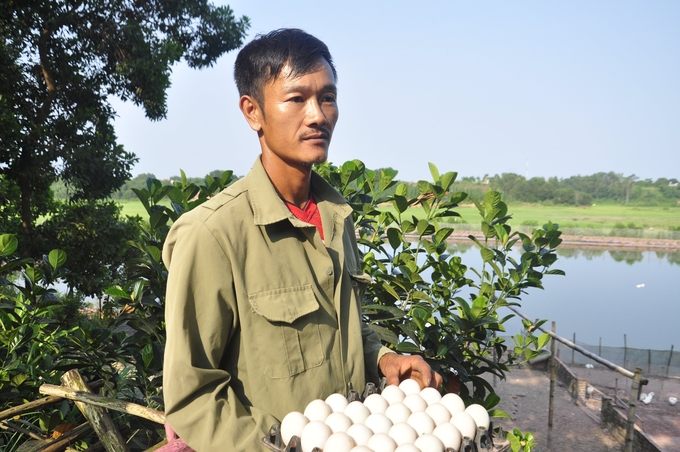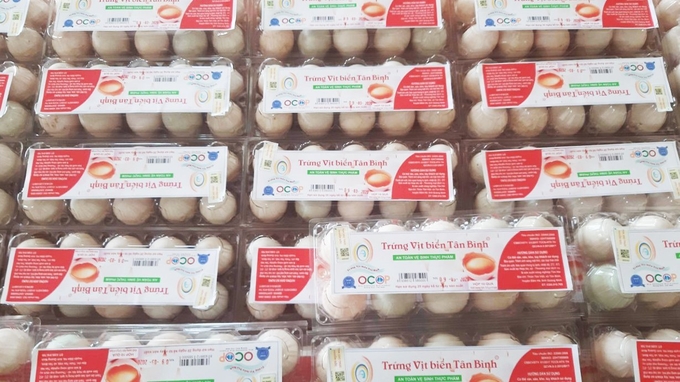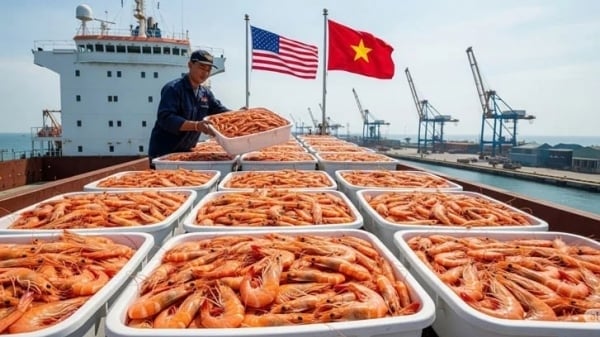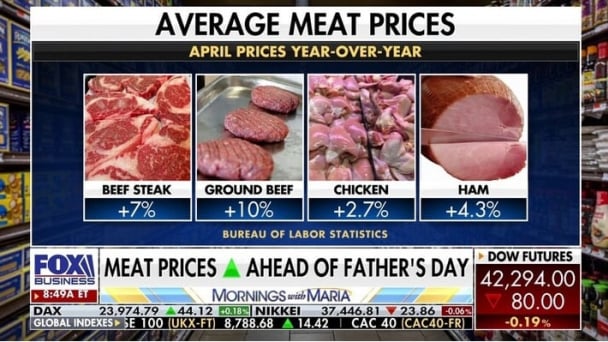June 14, 2025 | 19:54 GMT +7
June 14, 2025 | 19:54 GMT +7
Hotline: 0913.378.918
June 14, 2025 | 19:54 GMT +7
Hotline: 0913.378.918
Quang Ninh has a coastline of 250km long, with many tidal flats, which are favorable for the development of the marine economy and a variety of seafood. Raising sea ducks for eggs has become one of the economic models that bring great income to people.

Mr. Hoang Van Men earns 150 million per year from sea duck eggs. Photo: Nguyen Thanh.
Sea duck farming for eggs mainly develops in two localities of Quang Ninh province, namely Tan Binh commune (Dam Ha district) and Dong Rui commune (Tien Yen district).
Currently, all activities of raising sea ducks for eggs in Tan Binh commune (Dam Ha district) are carried out by members of the Tan Hai Agricultural Service and Trade Cooperative. This is the leading unit in bringing Tan Binh sea duck eggs into production according to professional processes in large quantities.
The household of Mr. Hoang Van Men, a member of the Tan Hai Agricultural Production and Service Cooperative, is the household with the largest number of sea ducks. Thanks to farming sea ducks for eggs, Mr. Men's family has a way to earn income.
Mr. Hoang Van Men (Binh Hai village, Tan Binh commune, Dam Ha district, Quang Ninh province) said that his family has farmed sea ducks for eggs for about 5 years. According to Mr. Men, his family used to raise cows, but it was not effective due to a lack of initiative in the source of food. After that, he decided to switch to raising sea ducks for eggs in 2017.
When he started raising sea ducks for eggs, he also faced many difficulties in capital, breeding facilities, and lack of experience. After that, thanks to studying hard, and following the correct technical and care processes, duck raising gradually became more stable.
From the original 400 sea ducks, now his family is raising nearly 1,000 sea ducks on a total area of 2.5ha.
Sea ducks are grazed in the sea, at tidal flats, eating natural foods such as crabs, fish, and oysters... so ducks have good resistance and are less susceptible to diseases. In addition to natural food, he also feeds sea ducks with corn and rice twice a day. This is what makes the quality of Tan Binh sea duck eggs different from ordinary duck eggs.
Tan Binh sea duck eggs are bigger than normal duck eggs, with thicker shells and more yolks inside. When eaten, the eggs are fragrant, fleshy, fatty, not fishy, with high nutrient content. Therefore, Tan Binh sea duck eggs are very popular with consumers.

Tan Binh sea duck eggs are packaged with labels. Photo: Cuong Vu.
Currently, with nearly 1,000 sea ducks, Mr. Men can get about 700 sea duck eggs per day at the time when the ducks are most fertile. If ducks are in the molting period, egg production will decrease.
Each month, he sells about 20,000 sea duck eggs/month with the price delivered to traders being VND4,000/egg. Every year, after deducting expenses, his family earns about VND150 million from raising sea ducks for eggs.
According to the Director of Tan Hai Trading, Service and Agricultural Cooperative, to ensure the quality of Tan Binh sea duck eggs, the cooperative always focuses on strict selection from seed, feed, and natural grazing area...
Ducklings are imported from reputable hatcheries and raised in the coastal intertidal environment, where there is a lot of food. In particular, ducks are grazed along the coast, so they are very healthy, less susceptible to diseases, and grow according to the natural environment, so the quality is very assured.
Since 2017, Tan Binh sea duck eggs have been rated as a 4-star OCOP product. In 2021, Tan Binh sea duck eggs of Tan Hai Agricultural Production and Trading Service Cooperative won the Vietnam Agricultural Gold Brand.
Since being recognized as an OCOP product, Tan Binh sea duck eggs have become more and more known and favored by consumers.
To improve the value of agricultural production and create many high-quality goods with local characteristics and advantages, Dam Ha district has made efforts to implement the OCOP program.
At the same time, Dam Ha district also strives to digitalize, bringing OCOP products of the district such as Tan Binh sea duck eggs, Ba Mien grilled pork leg, Pan Dam Ha knife, and dried radish...to the e-commerce platform.
Thereby helping businesses, cooperatives, and business households approach and get used to the new way of selling. It also provides many utilities, easy to manage and track in the digital environment, contributing to expanding the consumption market of local OCOP products.
Translated by Hoang Duy

(VAN) Noting risks, report examines impacts of avian influenza, changing trade patterns since 2022, fish fraud, and shipping industry’s net-zero goals.

(VAN) Mr. Tran Quang Bao, General Director of the Forestry and Forest Protection Department, met and worked with the International Wood Products Association to promote cooperation in the field of timber trade.

(VAN) China's outbound shipments of rare earths in May jumped 23% on the month to their highest in a year, though Beijing's export curbs on some of the critical minerals halted some overseas sales.

(VAN) To sustain capital flow, administrative reform alone is not enough; what farmers truly need is an ecosystem where both government and businesses grow together in support.

(VAN) Vietnam and the United States are proactively working together, each in their own way, to ensure that every container of agricultural goods carries not just products, but also long-term trust and value.

(VAN) Stores have started selling rice from the government’s stockpile to feed demand for the staple.

(VAN) Omaha Steaks CEO says rebuilding cattle herds will take about a year to ease price pressures.